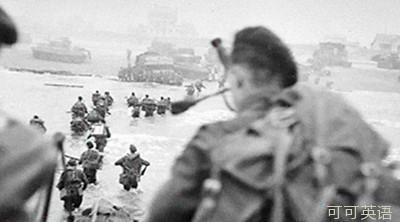訃告;比爾·米林;
Bill Millin, piper at the D-Day landings, died on August 17th, aged 88.
諾曼底登陸戰中的風笛吹奏者比爾·米林于2010年8月17日辭世,享年88歲。
Any reasonable observer might have thought Bill Millin was unarmed as he jumped off the landing ramp at Sword Beach, in Normandy, on June 6th 1944. Unlike his colleagues, the pale 21-year-old held no rifle in his hands. Of course, in full Highland rig as he was, he had his trusty skean dhu, his little dirk, tucked in his right sock. But that was soon under three feet of water as he waded ashore, a weary soldier still smelling his own vomit from a night in a close boat on a choppy sea, and whose kilt in the freezing water was floating prettily round him like a ballerina's skirt.

1944年6月6日(世稱D日—譯者注),當比爾·米林(Bill Millin)隨軍向法國諾曼底登陸戰場上的劍灘斜坡攻擊時,任何理性觀者都會認為米林沒有帶武器。與他的戰友們不同的是,面顯蒼白的21歲米林確實手中無槍。當然,米林一如往昔,身著全式蘇格蘭裝束,他帶有一把深得其喜愛的小佩劍(蘇格蘭高地人特有的——譯者注),也就是一把插在他那右邊的襪筒里的小匕首。不過,當他涉水上岸時,這身裝束很快沒入三尺海水中,他成了一位因在洶涌大海上、擁擠不堪的艦船里一夜折騰,嗅著自己嘔吐物疲憊不前的士兵。米林身著的蘇格蘭短裙(即小沈陽在《不差錢》中穿錯的那家什—譯者注)就像芭蕾舞女演員的裙子,在寒冷的海面上繞著米林優美漂蕩。
But Mr Millin was not unarmed; far from it. He held his pipes, high over his head at first to keep them from the wet , then cradled in his arms to play. And bagpipes, by long tradition, counted as instruments of war. An English judge had said so after the Scots' great defeat at Culloden in 1746; a piper was a fighter like the rest, and his music was his weapon. The whining skirl of the pipes had struck dread into the Germans on the Somme, who had called the kilted pipers “Ladies from Hell”. And it raised the hearts and minds of the home side, so much so that when Mr Millin played on June 5th, as the troops left for France past the Isle of Wight and he was standing on the bowsprit just about keeping his balance above the waves getting rougher, the wild cheers of the crowd drowned out the sound of his pipes even to himself.
然而,米林先生不是沒有武器,而是帶著勝于武器的東西。他帶著風笛,他先是把風笛舉過頭頂以防弄濕,隨后將風笛置于臂灣吹奏起來。根據久已形成的傳統,風笛成為了戰爭樂器。1746年英格蘭人取得卡洛登大捷后,一位英國法官裁定風笛是戰爭樂器。風笛吹奏者像其他士兵一樣,也是戰士,他奏出的樂曲就是他的武器。風笛發出的哀聲使法國索姆河畔的德國佬陷入絕望,他們把身著蘇格蘭短裙的風笛手叫作“來自地獄的女人”。而且,風笛聲也激勵起已方士氣,它甚至可以達到如許程度——6月5日,當部隊經過懷特島向法國進發時,米林站在船首撐桿旁吹奏風笛,海浪越來越洶涌,他只能勉強保持平衡,兵們發出的強烈歡呼聲淹沒了他的風笛聲。
His playing had been planned as part of the operation. On commando training near Fort William he had struck up a friendship with Lord Lovat, the officer in charge of the 1st Special Service Brigade. Not that they had much in common. Mr Millin was short, with a broad cheeky face, the son of a Glasgow policeman; his sharpest childhood memory was of being one of the “poor”, sleeping on deck, on the family's return in 1925 from Canada to Scotland. Lovat was tall, lanky, outrageously handsome and romantic, with a castle towering above the river at Beauly, near Inverness. He had asked Mr Millin to be his personal piper: not a feudal but a military arrangement. The War Office in London now forbade pipers to play in battle, but Mr Millin and Lord Lovat, as Scots, plotted rebellion. In this “greatest invasion in history”, Lovat wanted pipes to lead the way.
米林吹奏風笛是戰斗計劃的一部分。在威廉堡附近的特攻隊訓練時,他與英軍第一突擊旅指揮官洛瓦特(Lovat)勛爵建立起了友誼。在很大程度上,他倆并沒有多少共同點。米林身材五短、面龐寬大冷漠,是一位格拉斯哥警察的兒子;他最刻骨銘心的童年記憶就是“貧窮”,1925年隨家人從加拿大回蘇格蘭時,窮得睡在甲板上。而洛瓦特身材頎長,英俊無比且富于浪漫情懷;他有一座聳立于因弗內斯附近比尤利河岸之上的城堡。他要米林先生作他的私人風笛手:不是個人需要而是出于軍事安排。倫敦陸軍部當時禁止風笛手在戰斗中吹奏。但同為蘇格蘭人的米林先生和洛瓦特勛爵密謀不受陸軍部禁令約束。在這場“歷史上最偉大的登陸戰”中,洛瓦特要讓風笛聲為勝利指明方向。
He was ordering now, as they waded up Sword Beach, in that drawly voice of his: “Give us a tune, piper.” Mr Millin thought him a mad bastard. The man beside him, on the point of jumping off, had taken a bullet in the face and gone under. But there was Lovat, strolling through fire quite calmly in his aristocratic way, allegedly wearing a monogrammed white pullover under his jacket and carrying an ancient Winchester rifle, so if he was mad Mr Millin thought he might as well be ridiculous too, and struck up “Hielan' Laddie”. Lovat approved it with a thumbs-up, and asked for “The Road to the Isles”. Mr Millin inquired, half-joking, whether he should walk up and down in the traditional way of pipers. “Oh, yes. That would be lovely.”
當戰士們下艦向劍灘蹚去時,洛瓦特正以他慣有的緩慢悠長的聲音下命令:“風笛手,給——我們——整一曲!”。米林先生認為洛瓦特是一個瘋狂的混蛋。在即將發起攻擊的時刻,在洛瓦特身旁的一位戰士被子彈擊中面部倒下。但洛瓦特仍以他的貴族氣派相當冷靜地穿行于戰火之中(據說,在他的夾克下穿著一件有字母組合的白色套頭衫,手持一桿古老的溫徹斯特步槍),因此,如果洛瓦特真是瘋狂的混蛋的話,那么米林先生認為自己最好還是也成為瘋狂的混蛋,于是米林隨即奏起《嗨,熱情的少年》曲。洛瓦特翹起拇指贊同,隨后又要求米林吹奏曲子《通往小島之路》。米林半開玩笑地問,他是否應該以風笛手的傳統方式,在吹奏時上下行走。洛瓦特回應道“好,那樣好極了”!
Three times therefore he walked up and down at the edge of the sea. He remembered the sand shaking under his feet from mortar fire and the dead bodies rolling in the surf, against his legs. For the rest of the day, whenever required, he played. He piped the advancing troops along the raised road by the Caen canal, seeing the flashes from the rifle of a sniper about 100 yards ahead, noticing only after a minute or so that everyone behind him had hit the deck in the dust. When Lovat had dispatched the sniper, he struck up again. He led the company down the main street of Bénouville playing “Blue Bonnets over the Border”, refusing to run when the commander of 6 Commando urged him to; pipers walked as they played.
因此,他在劍灘海邊上下行走了三次。他深深記得:炮火中,劍灘在他腳下顫抖;海濤里,尸體撞擊他的雙腿。在搶灘后其它時間,每當指揮官發出命令,他就吹起風笛。他吹起風笛激勵攻擊部隊沿著卡昂運河(Caen Canal)凸路沖鋒,眼見在他前面約100碼處一敵方阻擊手的來福槍伸出火舌,在不到一分鐘的時間里,他身后的每個戰士都臥倒在已成殘骸的甲板上。當洛瓦特旅長消滅了狙擊手后,他又一次把風笛吹響。當英軍第六空降師突擊隊指揮官催促躲避戰火時,他予以拒絕,吹起《蘇格蘭狂想曲》把戰友們引向Bénouville大街;風笛手們的吹奏會顯靈。
He took them across two bridges, one (later renamed the Pegasus Bridge) ringing and banging as shrapnel hit the metal sides, one merely with railings which bullets whistled through: “the longest bridge I ever piped across.” Those two crossings marked their successful rendezvous with the troops who had preceded them. All the way, he learned later, German snipers had had him in their sights but, out of pity for this madman, had not fired. That was their story. Mr Millin himself knew he wasn't going to die. Piping was too enjoyable, as he had discovered in the Boys' Brigade band and all through his short army career. And piping protected him.
他帶領戰友們橫跨二座橋梁。一座后來叫飛馬橋,榴彈打在橋兩邊的金屬構件上,清脆猛烈;一座只有木欄桿,子彈呼嘯而過:“那是我曾經吹笛走過的最長的橋”。這兩次跨橋行動使他們與先期到達的部隊勝利會師。他后來了解到,在整個沖鋒途中,德軍阻擊手們的瞄準具已把他標定,但是,出于可憐他這個精神失常者,沒有射殺他。 這個故事是[被俘] 德軍講的。米林認為他不會死。從他結識Boys' Brigade 樂團到短暫軍旅生涯的始終,吹笛送軍前行太令人愉快了。吹笛也保佑著他。
The Nut-Brown Maiden
《棕色姑娘》
The pipes themselves were less lucky, injured by shrapnel as he dived into a ditch. He could still play them, but four days later they took a direct hit on the chanter and the drone when he had laid them down in the grass, and that was that. The last tune they had piped on D-Day was “The Nut-Brown Maiden”, played for a small red-haired French girl who, with her folks cowering behind her, had asked him for music as he passed their farm.
而風笛管就不太走運了,當米林向戰壕沖進時,笛管被炮彈損傷。雖然他尚可用笛管吹奏,但四天后,當米林將笛管放在草叢中時,風笛的舒音管和低音管被徹底擊壞,吹笛使命就此終結。在D日吹出的最后一支曲子是《棕色姑娘》,那是米林從一法國紅發小姑娘家人的農場經過時,應小姑娘的要求吹奏的,當時,小姑娘的父母在她身后抖縮不安。
He gave the pipes later to the museum at the Pegasus Bridge, which he often revisited, and sometimes piped across, during his long and quiet post-war career as a mental nurse at Dawlish in Devon. On one such visit, in full Highland rig with his pipes in his arms, he was approached by a smartly dressed woman of a certain age, with faded red hair, who planted a joyous kiss of remembrance on his cheek.
他后來把風笛贈給了飛馬橋博物館。戰后,他在德文郡的道利什作一名心理護理員,在整個漫長而平靜的職業生涯里,飛馬橋是他常常故地重游的地方。有時,他還重溫吹笛過橋。 在一次重溫時,他身著全式蘇格蘭裝束,將風笛置于臂灣,一位滿頭褪色紅發、身著整潔連衣裙的不再年輕的女士向他走來,在他臉頰上留下追憶的欣吻。












